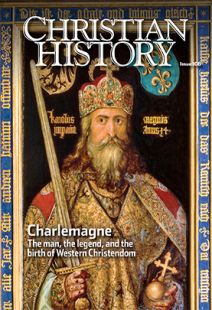Editor’s note: Charlemagne
WHY DOES Charlemagne matter? Why devote an issue of Christian History to an eighth-century king of a tribe called the Franks, a king who never learned to write, liked food and drink almost as much as he liked conquest, and went through wives like they were going out of style?
Perhaps we should because that king also ruled over much of modern France and Germany; was crowned emperor of the west—the first such emperor since the fifth century—by the pope, in Rome, on Christmas Day 800; and proceeded to usher in a new western age of intensified Christian education and culture.
The empire Charlemagne founded did not outlive his great-grandsons. But the ideas he founded are living still. As he wedded Christian devotion to state power and the remains of the Roman Empire to the energetic conquering spirit of the Franks, something new was born—the idea of Christendom, a Christian nation unified under a Christian king, where church and state worked and prayed hand in hand. Those ripples swelled into tidal waves over the next thousand years, as rulers struggled to build Christian kingdoms across Europe and, eventually, in America as well.
Crosses and crowns
Charlemagne, despite his own inability to write, also presided over a revival of learning. The idea that Rome “fell” overnight and all its learning was lost is considerably overstated, as you will soon read. But it is undoubtedly true that under Charlemagne’s direction, and that of scholars at his court and monasteries throughout his kingdom, many books were preserved, the level of literacy was raised, and a new handwriting was even invented. Later and more famous “renaissances,” or revivals of learning, built on the foundation stones Charlemagne laid. Proponents of what eventually got named the Renaissance, in the fourteenth century, claimed they had single-handedly “discovered” classical Greek and Roman literature and labeled the millennium before their time as “Dark Ages.” They were wrong.
Just as the articles for this issue were coming in from our team of authors, I happened to be traveling in the United Kingdom. There I drove along Hadrian’s Wall, which marked the northern boundary of the Roman Empire at its height. And there I stood on the floors of churches built in Charlemagne’s day, and I bowed in wonder before stone crosses carved in those remote British outposts, even while he sat on his throne in Aachen (now a city in modern Germany).
When the power of Rome’s empire receded in the fourth and fifth centuries, several hundred years before Charlemagne, the power of the church in Europe remained—a complicated power of monastic holiness and fierce conquest, of profound learning in ornate palaces and priests struggling to read the Latin liturgy in tiny rural chapels. This issue tells the story of an emperor and a people trying to make sense of who they were before God and who they were as a kingdom. Those are questions that have not gone away. They trouble us, and our nations, still. Read this story, and you will see that we are all still living in Charlemagne’s shadow. CH
Christian History thanks G. R. Evans, Timothy Johnson LaBarbera, and David Michelson for their assistance with portions of this issue.
By Jennifer Woodruff Tait
[Christian History originally published this article in Christian History Issue #108 in 2014]
Next articles
The Dark Ages? Think again
Charlemagne’s kingdom arose out of the scattered pieces of the declining Roman Empire, but also out of a vibrant Christian culture.
Edwin Woodruff TaitThe man behind the empire
Charlemagne was a paradox: a warrior who fostered scholarship, a man capable of ruthless rule and devout piety
G. R. EvansCharlemagne vs. the Saxons
Were the Saxon wars really driven by the desire to convert these pagans?
G. R. EvansHow the Irish saved (Carolingian) civilization
Irish scholars, bards, and scientists were recruited to serve in Charlemagne’s court
Garry J. Crites



